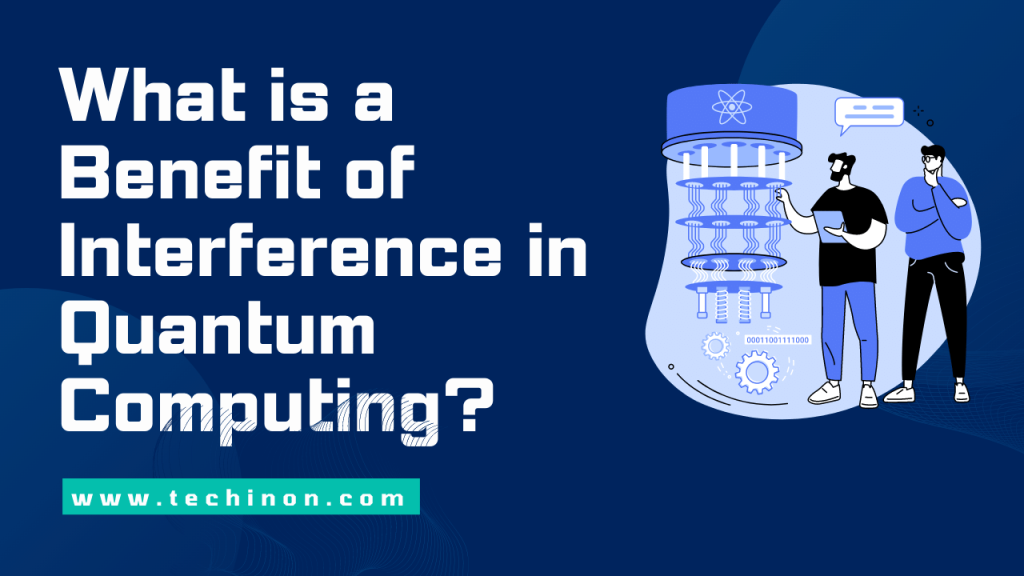Quantum computing, an area that never ceases to amaze, hides within its intricate machinery a phenomenon called interference. Just as the ripples on water can either cancel out or amplify based on their overlapping patterns, quantum interference manipulates the probabilities of quantum bits, or qubits. This power, though invisible, ignites quantum computers’ potential, catapulting them far beyond classical counterparts.
Prepare to be captivated by our in-depth analysis of ‘What is a Benefit of Interference in Quantum Computing?’. Whether you’re a novice or an expert, this article is designed to inform and inspire, providing you with a fresh perspective on this intriguing subject. Get ready to be enlightened!
How does interference improve quantum computing?
Imagine two waves converging. If they align perfectly, they create a bigger wave. If they are out of sync, they diminish. This is interference. In the quantum realm, it works by manipulating probabilities. When qubits undergo operations and are finally measured, they can interfere constructively, reinforcing certain outcomes, or destructively, diminishing others. This selective amplification and cancellation enable quantum algorithms to find answers efficiently.
Can you explain quantum superposition and interference?
At the core of quantum mechanics lie concepts of superposition and interference. A qubit in superposition isn’t simply a 0 or 1 but both simultaneously, up until it’s measured. As operations are performed on these qubits, they produce different paths. Interference ensures that paths leading to the right answer get enhanced while the wrong ones get cancelled out.
Why is interference important for quantum parallelism?
Quantum parallelism is the computer’s ability to evaluate multiple possibilities simultaneously. This happens because of superposition. However, just evaluating isn’t enough. We need to extract the right answer. Here, interference plays its part. It fine-tunes the results, ensuring accuracy and speed.
What role does interference play in quantum algorithms?
Many quantum algorithms, like Grover’s and Shor’s, hinge on interference. By manipulating qubit states and introducing quantum interference patterns, they significantly speed up problem-solving compared to classical algorithms.
How does interference lead to faster quantum computation?
Interference acts as a filter. By amplifying desired outcomes and reducing undesired ones, it helps quantum computers zero in on the correct answer faster than classical machines that test each possibility sequentially.
Are there practical applications of quantum interference outside of computing?
Absolutely! Beyond computing, quantum interference is vital in technologies like quantum cryptography and quantum teleportation, revolutionizing communication and security.
How do interference patterns help us extract information in quantum measurements?
Quantum interference patterns are like fingerprints of quantum data. By studying these patterns, scientists can glean insights about the quantum states and processes that produced them, informing optimization and debugging efforts.
What challenges are associated with maintaining interference in quantum systems?
Quantum decoherence is a major hurdle. This is when qubits lose their quantum behavior due to external influences, causing interference to dissipate. Quantum error correction and optimizing quantum gate fidelity are active areas of research to counter these challenges.
How do different types of qubits affect interference in computations?
Different qubits—whether superconducting, trapped ions, or photonic—have unique properties affecting their coherence times and susceptibility to external disruptions. Tailoring interference-based algorithms to the qubit type is essential for maximum efficiency.
The Depth and Breadth of Interference in Quantum Technologies
As quantum computing matures, its nuances, especially interference, become ever more fascinating. Unraveling the mystery of interference isn’t just an academic endeavor; it’s the key to unlocking the vast potential of quantum technologies.
What quantum algorithms rely heavily on interference effects?
Interference is the magic behind several quantum algorithms. For instance, Grover’s algorithm, which searches databases, leverages interference to speed up the search process. Similarly, Shor’s algorithm, known for factoring large numbers efficiently, fundamentally uses interference to reveal the periodicities of specific functions, a step central to its success. Without interference, these algorithms would lose their quantum advantage.
How does interference relate to the stability of quantum states in a computation?
Interference directly impacts the stability of quantum states. Stable interference patterns indicate coherent quantum states, which are crucial for reliable computations. Unwanted interactions with the environment can disrupt these patterns, leading to quantum decoherence. Thus, maintaining stable interference is tantamount to preserving the integrity of quantum computations.
Can quantum interference enhance the accuracy of certain computations?
Certainly. Quantum interference can increase the probability amplitudes of desired outcomes, effectively enhancing the accuracy of results. By adjusting interference patterns, quantum computers can be tuned to prioritize and amplify specific solutions, making them more likely to be observed upon measurement.
What recent advancements have been made in controlling interference for quantum technologies?
Research in quantum phase shifts and quantum gate operations has seen significant breakthroughs. Advanced techniques now allow for more precise control of interference patterns, leading to enhanced performance in quantum logic gates. Innovations in quantum materials and isolating systems from environmental noise also play a crucial role in maintaining desired interference patterns, paving the way for more robust quantum computations.
How does interference contribute to solving complex problems using quantum computers?
In classical computers, solving certain problems requires checking every possible solution, a time-consuming process. Quantum computers, with their superposition and interference, can process vast amounts of information simultaneously. Interference ensures that the probabilities of incorrect answers cancel out, leaving behind only the right solutions. This capability can potentially tackle problems deemed intractable for classical systems, such as optimizing complex systems or simulating large molecules in drug development.
How do interference patterns correlate with quantum measurements?
When a quantum system is measured, it collapses from its superposition state to a definite state. The probabilities of each state depend on interference patterns. By analyzing these patterns, scientists can glean invaluable insights into the quantum processes at play, facilitating the design of better quantum systems.
Are there applications of quantum interference outside of pure computation?
Absolutely! Interference has vast implications in quantum information processing. Quantum sensors, which exploit interference patterns, can detect minute changes in physical quantities with unprecedented precision. Quantum cryptography, which ensures ultra-secure communication, also harnesses interference to detect eavesdroppers.
FAQs about Quantum Interference in Computing
Can interference be used for error correction in quantum computing?
Yes, certain error correction codes use interference to detect and rectify errors, maintaining quantum information integrity.
What happens when interference is lost in a quantum computation?
Losing interference, often due to decoherence, can diminish the computation’s accuracy and efficiency.
Can you compare the benefits of interference and entanglement in quantum computing?
Both are foundational. While interference fine-tunes the quantum data, entanglement, another quantum phenomenon, allows qubits to be correlated in ways classical bits can’t, enabling complex quantum operations.
Are there any drawbacks to relying on interference in quantum information processing?
While interference is powerful, maintaining it requires stringent conditions. External influences can disrupt interference, impacting the computation.
Also Read: How is Accenture Addressing the Emerging Market for Quantum Computing Technology?
Conclusion
Interference, in the realm of quantum mechanics, is not merely a passive phenomenon but a dynamic tool shaping the destiny of quantum technologies. As researchers delve deeper, innovations around interference continue to push the boundaries of what’s possible. With a blend of curiosity and ingenuity, the quantum community stands poised to transform this subtle principle into tangible breakthroughs for the future.
To sum it up, this article has shed light on various aspects of “What is a Benefit of Interference in Quantum Computing?” providing valuable insights and answering your most pressing questions.

